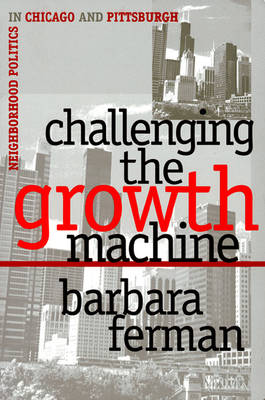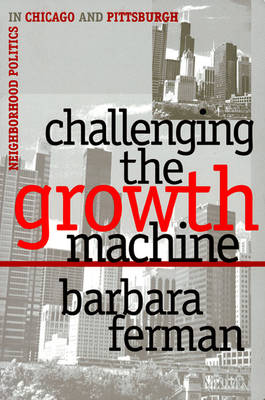
- Retrait gratuit dans votre magasin Club
- 7.000.000 titres dans notre catalogue
- Payer en toute sécurité
- Toujours un magasin près de chez vous
- Retrait gratuit dans votre magasin Club
- 7.000.0000 titres dans notre catalogue
- Payer en toute sécurité
- Toujours un magasin près de chez vous
30,95 €
+ 61 points
Description
Economic development and urban growth are the contested grounds of urban politics. Business elites and politicians tend to forge "pro-growth" coalitions centered around downtown development while progressive and neighborhood activists counter with a more balanced approach that features a strong neighborhood component. Urban politics is often shaped by this conflict, which has intellectual as well as practical dimensions. In some cities, neighborhood interests have triumphed; in others, the pro-growth agenda has prevailed. In this illuminating comparative study, Barbara Ferman demonstrates why neighborhood challenges to pro-growth politics were much more successful in Pittsburgh than they were in Chicago. Operating largely in the civic arena, Pittsburgh's neighborhood groups encountered a political culture and institutional structure conducive to empowering neighborhood progressivism in housing and economic development policymaking. In contrast, the pro-growth agenda in Chicago was challenged in the electoral arena, which was dominated by machine, ward-based politicians who regarded any independent neighborhood organizing as a threat. Consequently, neighborhood demands for policymaking input were usually thwarted. Besides revealing why the development policies of two important American cities diverged, Ferman's unique comparative approach to this issue significantly expands the scope of urban analysis. Among other things, it provides the first serious study to incorporate the civic sector--neighborhood politics--as an important component of urban regimes. Ferman also emphasizes institutional and cultural factors--often ignored or relegated to residual roles in other studies--and expounds on their influence in shaping local politics and policy. To add an analytical and normative dimension to urban analysis, she focuses on the "non-elite" actors, not just the economic and political elites who compose governing coalitions. Ultimately, Ferman takes a more holistic and balanced view of large cities than is typical for urban studies as she argues that neighborhoods are an important, integral part of what cities are and can be. For that reason especially, her work will have a profound impact upon our understanding of urban politics.
Spécifications
Parties prenantes
- Auteur(s) :
- Editeur:
Contenu
- Nombre de pages :
- 208
- Langue:
- Anglais
- Collection :
Caractéristiques
- EAN:
- 9780700607877
- Date de parution :
- 10-09-96
- Format:
- Livre broché
- Format numérique:
- Trade paperback (VS)
- Dimensions :
- 152 mm x 229 mm
- Poids :
- 317 g

Les avis
Nous publions uniquement les avis qui respectent les conditions requises. Consultez nos conditions pour les avis.






